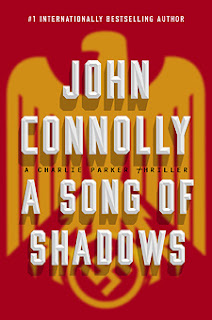Sometimes the traveling and the taste of a different culture are a bit more subtle, though. The Cumberland Creek mysteries from Mollie Cox Bryan propose small-town life rich with women's friendships. Women who have enough time to get together regularly on Saturday (!) evenings for scrapbook work parties -- that is, to hold "a crop." And on top of that, women who completely accept each other's diversity (from Christian to Jewish to Wiccan) because they value each other's support so fully.
It's a lovely world that this author has created, and her fifth mystery set in "Cumberland Creek," Virginia, SCRAPBOOK OF THE DEAD, provides a long tender visit with about-to-be-ex investigative journalist Annie, bakery owner DeeAnn, elderly Beatrice (and her new French husband), and others who keep each other going. It's October, and the group's saluting autumn in scrapbook images and colors, when the warm comfort of their group is interrupted by murder ... by two murders, in fact, of sisters who were immigrants working in their town. To their shock, they haven't even realized the area's famous pie restaurant takes advantage of new immigrants, paying well below the going wage through an international "agency." Equally shocking to Annie, DeeAnn, and Beatrice is realizing they didn't even notice the new row of low-end housing where these workers live.
Annie's journalism job keeps her motivated to dig into the murders, while her friends move into action out of compassion and a sort of embarrassment at how they've ignored the most unfortunate women in their community, including the first murdered woman, Marina. That murder has another connection to this group, which Annie reveals:
Annie just smiled and fingered through her stack of cardstock. "You know, I almost forgot about the scrapbook page."It's even more disturbing when the women realize that Marina's sister, also murdered, was also holding a scrapbook page at the time she was killed.
"What?" DeeAnn said.
"Marina was holding a scrapbook page when they found her," Annie said.
The room silenced.
"Disturbing," DeeAnn finally said.
Cox weaves multiple investigations through the gentle probing by each of her main characters. Motive? Means? Opportunity? The fragments they uncover, like bits of a scrapbook page, won't make sense until the final faces are added, as the book reaches a crescendo during the week of Halloween.
This is a classic "cozy" mystery with plenty of family, friendship, and desserts involved, and gentle pressure toward solving the case. Read it for entertainment and the pleasure of page-turning without effort -- a mystery meant for fun and to honor the warmth of friendships in the author's own life. No need to have read the four books before this one, but some details will mean more (like Cookie's amnesia and Annie's family issues) if you have.
No recipes in this one, but an intriguing glossary of "terms for the modern scrapbooker" and some tips for the craft. From Kensington Books, where the art of the cozy series is being perfected.














